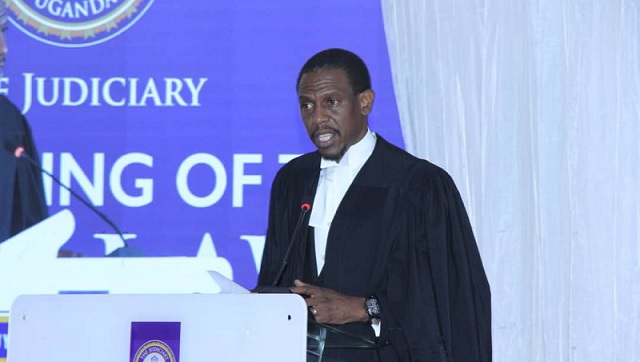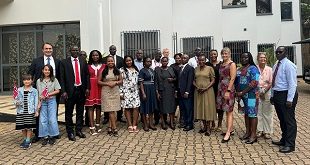
Kampala, Uganda | THEINDEPENDENT | The Attorney General, Kiryowa Kiwanuka has said that court rulings on whether the military court should try civilians plunged his chambers into confusion.
Kiwanuka, in a speech at the opening of the New Law Year 2023, said the confusion is arising from the judgments from the Court of Appeal and the Supreme Court.
“The President of the Uganda Law society mentioned the recent case of the court of appeal on the trial of civilians at military courts. Now I’m at pain. Because everyone is quoting the recent judgment but I have a supreme court justice. So how do I advise?” wondered Kiryowa
“Do I follow the court of appeal judgment? Do I follow the supreme court judgment? Because the supreme court judge said it is okay. You can do it because you can follow these rules”
While saying he is at pain on how to proceed given the contradictions between the two judgments, Kiryowa said he has resorted to the rules that govern the court practice. “Because once the court gives me a clear signal of what it expects as the answer, that is the opinion that you expect from the Attorney General’s chamber,” he said
In December 2022, the Constitutional Court in a judgment said it was illegal to try civilians in military courts. The judges, in a majority decision of three to two, under the 1995 Constitution, trial of civilians is the role of civilian courts of judicature. “I would declare that the UPDF Act, 2005 to the extent that it may be understood as conferring jurisdiction on military courts to try civilians is unconstitutional and therefore null and void,” Justice Elizabeth Musoke, who wrote the lead judgment noted.
It was the second time that the Constitutional court was delivering a judgment barring courts from trying civilians.
Uganda Law Society President, Bernard Oundo again voiced concern over the continued trial of civilians in military courts despite the judgments by the constitutional court.
The trial of civilians by the military has been criticized at local, regional, and international levels. Human Rights Watch in a report, “Righting Military Injustice: Addressing Uganda’s Unlawful Prosecutions of Civilians in Military Courts,” documents the pattern of trials of civilians before military courts, the ways in which such trials violate international legal principles, and the steps Uganda should take to address these fair-trial violations.
Uganda is among some of the countries in Africa which have been criticized by the African Commission on Human and People’s Rights over trials of civilians by the military under the UPDF Act. The African Commission has emphasized the fact that military courts should respect the guarantees of the right to a fair trial.
The African Commission has held that “military tribunals must be subject to the same requirements of fairness, openness, justice, independence and due process as any other process” Ugandan courts have grappled with the questions of whether the General Court Martial has jurisdiction over civilians; whether the courts-martial are independent and impartial courts in the meaning of Article 28(1) of the Constitution.
Is Kiryowa running away from responsibility?
The Attorney General’s utterance attracted a number of murmurs among some of the lawyers attending the opening of the New Law Year 2023 at the High Court in Kampala. Some who asked for anonymity suggested that Attorney General should be able to interpret the judgments and ensure that judgments are enforced by the state.
Makerere University Law don Dr, Ronald Naluwayiro, who is also an expert on military justice and human rights was seemingly not convinced by the argument raised by the Attorney General. “But he is the Attorney General and he knows the hierarchy of courts. The Supreme Court decision takes precedent. The two decisions by courts have to be seen in light of Uganda’s international obligations. I draw your attention on the reports of the African Commission of Human and People’s Rights” said Dr. Naluwayiro, who has published several articles about military courts and human rights.
Justices Kenneth Kakuru and Geoffrey Kirwabwire and Elizabeth Musoke in 2022 held that by Parliament enacting the UPDF Act, it acted beyond its powers by creating courts that were never envisaged in the Constitution.
“It becomes clear that the framers of the 1995 Constitution intended that, as a general rule, only the courts spelled out under Article 129(1) would be involved in the administration of justice for civilians. These courts are the Supreme Court, the Court of Appeal, and the High Court as superior courts of record. The framers of the 1995 constitution also permitted Parliament to create such subordinate courts as it would deem fit… it is in my view, incontrovertible that Military courts are not courts of judicature…that as a general rule, such Military Courts have no role in the administration of justice for civilians. They are neither Superior Courts nor subordinate Courts,” Musoke held.
According to Justice Musoke, the framers of the 1995 Constitution intended to establish an armed force, whose chief function is to defend the sovereignty of Uganda, and they allowed the UPDF to exercise additional functions, but these functions did not extend to the field of administration of justice for civilians.
A similar judgment was delivered in July 2021 in the famous Michael Kabaziguruka petition. The Judges held that military courts were not courts of judicature that the constitution talks about.
The lead judgment written by Justice Kenneth Kakuru and joined by Justice Remmy Kasule and Hellen Obura, the court observed that the UPDF Act was never intended to be an Act of general application.
The Court in 2022 ordered that all files of civilians in military courts should be transferred to the high court in 14 days under the stewardship of the DPP.
The UPDF Act provides for circumstances in which the General Court Martial has jurisdiction over civilians. section 119(1) of the UPDF Actprovides that “persons subject to military law” include serving military officers and: (g) every person, not otherwise subject to military law, who aids or abets a person subject to military law in the commission of a service offence; and (h) every person found in unlawful possession of: (i) arms, ammunition or equipment ordinarily being the monopoly of the Defence Forces; or (ii) other classified stores as prescribed. On the basis of section 119(1)(g) and (h), many civilians have been prosecuted before the General Court Martial for offences such as the unlawful possession of firearms or ammunition, aiding and abetting soldiers to commit offences, and treason.
*****
URN
 The Independent Uganda: You get the Truth we Pay the Price
The Independent Uganda: You get the Truth we Pay the Price


